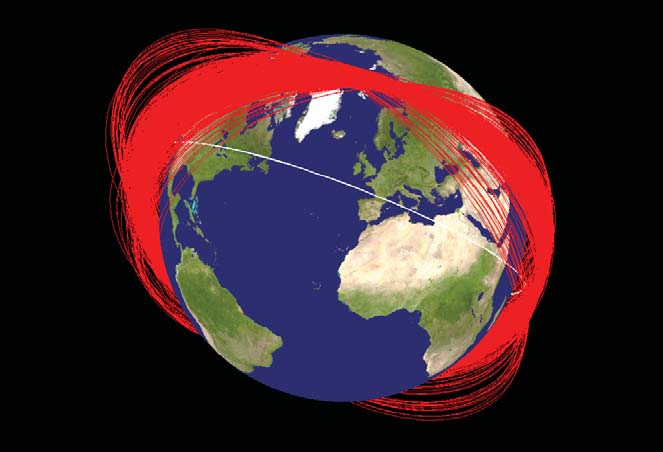Welcome to DU!
The truly grassroots left-of-center political community where regular people, not algorithms, drive the discussions and set the standards.
Join the community:
Create a free account
Support DU (and get rid of ads!):
Become a Star Member
Latest Breaking News
General Discussion
The DU Lounge
All Forums
Issue Forums
Culture Forums
Alliance Forums
Region Forums
Support Forums
Help & Search
LongTomH
LongTomH's Journal
LongTomH's Journal
January 8, 2013
........//snip
The US does have an interest in preventing China from testing another ASAT weapon. Debris from the 2007 test threatened the International Space Station. The image below shows the orbit of the ISS as a blue line and the orbits of the debris from the 2007 test in red:

There's another level to this: China's space program is advancing rapidly (See the Dragon Space page at SpaceDaily.com for updates.). If the two countries continue to take a confrontational approach, that could mean a new arms race in space, which would of course, benefit the Military-Industrial-Complex. On the other hand, cooperation could make extended human missions beyond Earth orbit easier.
Will China test an anti-satellite weapon this month?
There have been a number of recent posts on the net warning of an imminent test of an anti-satellite weapon by China. One of these is by the Union of Concerned Scientists: Is January Chinese ASAT Test Month?
n 2007 and 2010 China conducted anti-satellite (ASAT) weapons tests, both on January 11. Rumors circulating for the past few months suggest that some within the U.S. defense and intelligence community believe China is preparing to conduct another ASAT test.
The first media report on these rumors appeared in October. China’s Ministry of Defense challenged the information in that report, but in November contacts in China told us an announcement about an upcoming ASAT test was circulated within the Chinese government. We were unable to find a public statement confirming plans for a test in the Chinese media or on publicly accessible Chinese government websites. Then, just before Christmas, a high-ranking U.S. defense official told us that the Obama administration was very concerned about an imminent Chinese ASAT test.
........//snip
The Obama administration has three choices: it can make a quiet diplomatic effort to persuade China to cancel or at least postpone the test, it can publicly call on China not to test, or it can remain silent until China conducts the test and then complain about it afterwards. The Bush administration took the latter approach and the space environment is much worse off for it. Despite having seen the ASAT system tested at least twice before the Jan. 11 2007 destruction of the Fengyun 1C, the Bush administration did not communicate its concerns to China, and we will never know if this might have influenced China’s decision.
The Obama administration should try to dissuade China from conducting the test. China may decide to test anyway, but it might see value in canceling or postponing the test to discuss these issues with the U.S. The Chinese Foreign Ministry routinely expresses support for diplomatic efforts to create an international space security framework. This approach is also in line with U.S. Defense Department policy. Its Oct. 2012 Directive on Space Policy, which lays out the range of approaches the DOD will take to mitigate the threat posed by the development of systems that can interfere with satellites, says it will “support the development of international norms of responsible behavior” in space. Acting to prevent irresponsible behavior before it happens is a clearly preferable approach to supporting international norms than waiting to act until after they have been violated.
High-level intervention in both countries is needed to stop the test and start discussions. Remarkably, there are no regular channels of communication on space issues between China and the United States. Congressional opposition to scientific and commercial cooperation with China in space shut down potential talks on human space flight that could have led to a bilateral dialog on space security.
The US does have an interest in preventing China from testing another ASAT weapon. Debris from the 2007 test threatened the International Space Station. The image below shows the orbit of the ISS as a blue line and the orbits of the debris from the 2007 test in red:

There's another level to this: China's space program is advancing rapidly (See the Dragon Space page at SpaceDaily.com for updates.). If the two countries continue to take a confrontational approach, that could mean a new arms race in space, which would of course, benefit the Military-Industrial-Complex. On the other hand, cooperation could make extended human missions beyond Earth orbit easier.
Profile Information
Member since: Wed Oct 13, 2004, 05:42 PMNumber of posts: 8,636